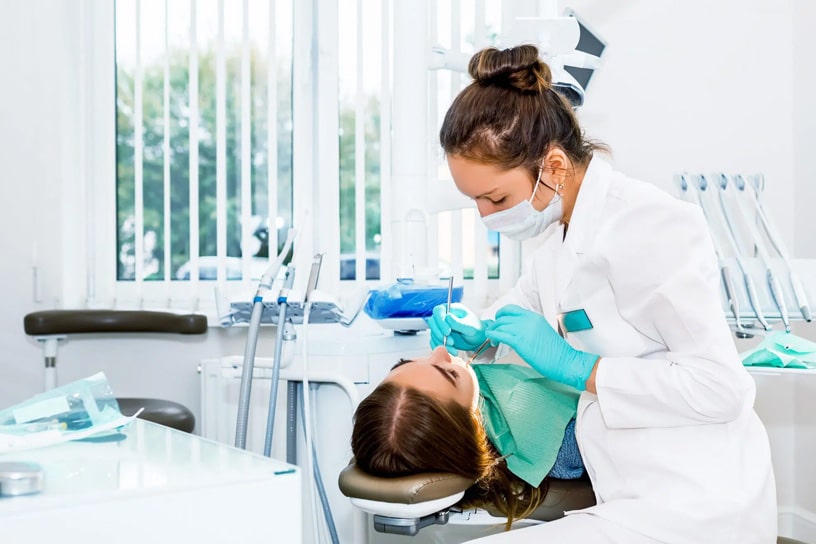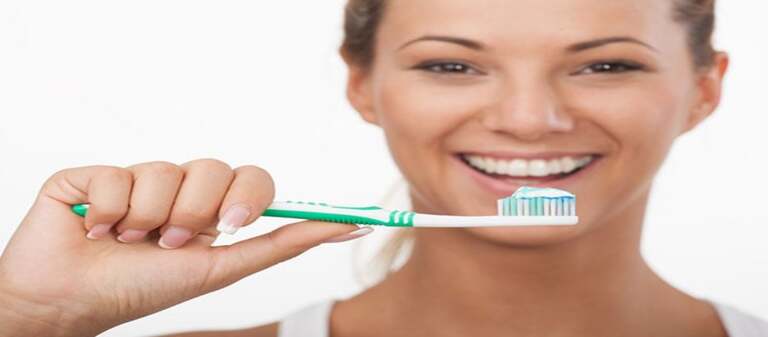Caring for your teeth and mouth is essential for your overall health. Here are some tips to help you maintain your oral health:
- BRUSH TWO TIMES IN A DAY FOR AT LEAST TWO MINUTES EACH TIME.
The right way to brush your teeth is by using a pea-sized amount of toothpaste on your toothbrush and then brushing the bristles against your teeth in a circular motion. It would help if you also brushed on the inside surfaces of your teeth. Be sure to spit out the toothpaste after brushing.
2. USE MOUTHWASH.
Mouthwash can help remove food particles and plaque from teeth and gums that brushing alone may miss. Use mouthwash according to the package directions – typically, you must swish it around in your mouth for 30 seconds only before spitting it out.
- FLOSS YOUR TEETH ONCE A DAY.
Flossing helps you to get rid of plaque and food particles from between your teeth and along your gum line. Start by breaking off about 18 inches of floss and wrapping most of it around your middle finger. Hold the floss tightly around your other index finger. Gently insert the floss between two teeth using a back-and-forth motion. Ensure to curve the floss around every tooth base in a C shape.

4. REPLACE YOUR TOOTHBRUSH REGULARLY.
Changing your toothbrush every 3 to 4 months or sooner is essential. If you have a cough or cold, replace your toothbrush when you recover to avoid re-infecting yourself.
- EAT HEALTHY FOODS AND LIMIT SUGARY DRINKS AND SNACKS
A healthy diet is good for your teeth and gums! Eating lots of fruits, vegetables, and whole grains and limiting sugary drinks and snacks can help keep your mouth healthy.
- USE DENTAL HYGIENE PRODUCTS.
Various dental hygiene products are available to help keep your teeth and gums healthy, including toothpaste, mouthwash, floss, and dental picks. Speak to your dentist to know which products are right for you.
- HAVE A HEALTHY LIFESTYLE.
Your overall health, including oral health, is linked to your lifestyle choices. For example, smoking and using other tobacco products can increase your risk of gum disease and other oral health problems. Drinking too much alcohol can also harm your teeth and gums. However, making healthy choices – like eating well, exercising, and not smoking – can help you maintain a healthy mouth.
- LEARN MORE ABOUT TEETH AND GUMS.
The more aware you are about caring for oral health, the better you can take care of your teeth and gums! First, use resources like books, websites, and dental professionals to learn about caring for your mouth. Then, talk to your dentist about what you can do to keep your mouth healthy.
9. GET REGULAR DENTAL CHECK-UPS.
Even if you look after your teeth and gums at home, you must see your dentist regularly for professional cleanings and check-ups. So be sure to schedule a visit every six months!
10. KEEP HYDRATED THROUGHOUT THE DAY.
Drinking water helps keep your mouth and body healthy. It’s vital to drink plenty of water every day to prevent dehydration. Drinking water also helps rinse food particles and plaque, keeping your teeth and gums clean.
11. CONSIDER DENTAL SEALANTS.
Dental sealants are thin, plastic coatings made to be placed on the chewing surfaces of the molars. Sealants protect the teeth from cavities by filling in the grooves and pits that can trap food and bacteria. Consider getting dental sealants placed on your teeth to offer protection.
12. REGULARLY EXAMINE YOUR MOUTH ON YOUR OWN.
You can self-examine your mouth at home to look for signs of oral health problems. Use a bright light and a mirror, and look closely at your teeth, gums, tongue, and cheeks. If you see anything that looks abnormal – like red or swollen gums, sores, spots, or lumps – be sure to see your dentist immediately.
Common Misconceptions About Teeth and Mouth
- It’s okay to skip flossing. Wrong! Flossing is just as essential as brushing; it helps remove food particles and plaque from areas your brush can’t reach. Be sure to floss at least once in 24 hours.
- Mouthwash is optional. Wrong! Mouthwash can help rinse food particles and plaque, keeping your mouth healthy.
- You don’t need to fix an appointment with your dentist unless you have a problem. Wrong! It’s recommended to see your dentist regularly for professional cleanings and check-ups, even if you don’t have any oral health problems.
- There’s nothing you can do to prevent cavities. Wrong! You can do various things to prevent cavities, including brushing, flossing, using mouthwash, eating healthy food, and avoiding sugary snacks.
- Bleeding gums are normal. Wrong! Bleeding gums may indicate gum disease, so you must see your dentist if you notice any bleeding.
- Teeth whiteners are safe for everyone. Wrong! Teeth whiteners can cause tooth sensitivity and other side effects. Talk to your dentist before using any teeth whitener.
- It’s okay to use your teeth as tools. Wrong! Using your teeth as tools – like opening bottles or ripping open packages – can damage your teeth and lead to oral health problems.
- All mouthwashes are the same. Wrong! There are many different types of mouthwash, each designed for a specific purpose.
- There’s nothing you can do to prevent gum disease. Wrong! You can do lots to prevent gum disease, including brushing, flossing, using mouthwash, and fixing an appointment with your dentist regularly for professional cleanings and check-ups.
These are just a few things you can do to keep your teeth and gums healthy. To know more about caring for your teeth and gums, speak to our experts. Call us at (03) 9646 2577 or drop an email at [email protected].
FREQUENTLY ASKED QUESTIONS
What are some of the good practices to have healthy teeth?
There are a few key things to keep in mind when it comes to having healthy teeth:
- Make sure to brush your teeth at least twice daily with fluoride toothpaste.
- Floss at least once a day.
- Eat a balanced diet and limit sugary snacks and drinks.
- See your dentist for regular check-ups and cleanings.
If you follow these simple tips, you can keep your teeth healthy and strong for years to come!
Can you skip flossing your teeth?
No. Flossing your teeth is essential to oral care because it helps remove plaque and bacteria between your teeth and gums. Plaque can cause tooth decay and gum disease, so it’s vital to floss regularly to keep your teeth healthy.
If you have trouble flossing, you can do a few things to make it easier. Use a floss holder or pick to help you get the floss into the hard-to-reach spaces between your teeth. Or, try using an electric toothbrush with built-in flossing capabilities. Whatever method you use, floss carefully and gently to avoid irritating your gums.
How can you care for your gums?
Proper oral care is essential for maintaining healthy gums. You should brush your teeth at least twice daily with a toothbrush with soft bristles and use fluoride toothpaste. It would help if you also floss at least once a day. Please speak to your dentist if you have any questions about oral care or want more information on properly caring for your gums. They can provide personalised advice on maintaining healthy gums and keeping your smile looking its best.
Related posts:
No related posts.









